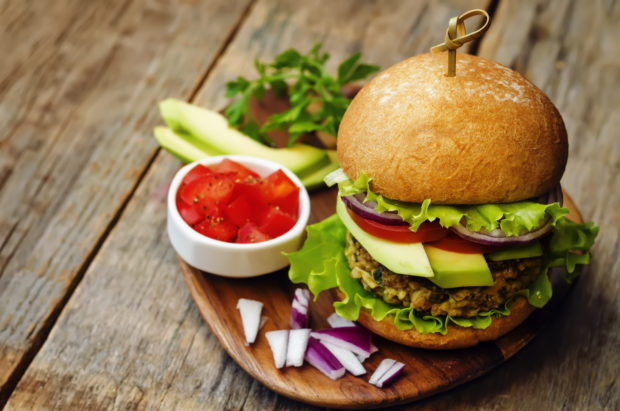
Clearly, plant-based foods have a bright future and one that couldn’t have come sooner, for the welfare of animals, the earth and humanity. Photo by nata_vkusidey/iStock.com
At the Super Bowl this year, we caught a glimpse of the future of food from an unlikely source: Carl’s Jr. During the big game, the fast food chain advertised its new Beyond Burger — a patty that tastes just like meat, but is entirely plant-based. For a major fast food chain to announce a plant-based menu item via a national Super Bowl ad is a turning point in the movement to put less meat and more plants on American plates. And this movement has continued to gain incredible traction in 2019, with more fast food chains now offering meatless options as the entire plant-based food industry continues to grow exponentially.
Burger King recently announced it will offer the (plant-based) Impossible Burger as a Whopper nationwide. In a New York Times article, Burger King’s chief marketing officer, Fernando Machado, said even the company’s own employees can’t tell the difference between a Whopper made from beef and one made from plants. “People on my team who know the Whopper inside and out, they try it and they struggle to differentiate which one is which,” he said.
White Castle now offers Impossible Burger sliders for just 99 cents. The national taco chain Del Taco offers Beyond beef nationwide and calls it “the future of tacos.” TGI Friday’s offers the Beyond Burger. At the uber-hip chain Umami Burger, the plant-based patty is selling like hotcakes: the company announced it’s a top-three seller at all locations, and now accounts for a full one-fifth of the chain’s entire sales. Little Caesar’s just announced a partnership with Impossible to test out a new “Impossible Supreme” pizza.
Even KFC recently announced that it is exploring plant-based chicken. Just today, global food giant Nestle announced it will launch its own plant-based burger in the United States. And when the company Beyond Meat went public in early May, its stock price soared 163% in a day (disclosure: the Humane Society of the United States has a venture capital mission-related investment in Beyond Meat).
The groundswell is happening beyond U.S. borders as well. Recently, Grupo Mantiqueira, Brazil’s largest egg producer, launched a plant-based egg, and another Brazilian company, Fazenda Futuro, launched the plant-based “Futuro Burger”.
Clearly, plant-based foods have a bright future and one that couldn’t have come sooner, for the welfare of animals, the earth and humanity. As an article in our most recent issue of All Animals magazine points out, Americans today eat more meat than anyone in the world—100 pounds per person every year, or three times the global average. If Americans ate plant-based diets, U.S. agriculture could feed about 350 million more people. On top of that, it would be a more efficient use of natural resources, and eliminate the animal suffering and misery that factory farming causes throughout the world today.
At the HSUS and Humane Society International, we are proud of the role we’ve played in advancing this historic transformation in dietary choice, by helping the world’s largest food service companies, restaurant chains and grocery stores add and promote plant-based options. With the vast majority of animals in the food supply living in squalid conditions on factory farms — and with agribusiness playing a large role in environmental destruction and climate change — the more plant-based proteins we eat, the better off we’ll all be.
Our Farm Animal Protection teams at the HSUS and HSI have worked with major corporations here in the United States and globally to reduce the suffering of animals raised for food, and earlier this year, we launched a Food Industry Scorecard to track and rank companies in the United States based on their animal welfare progress. That scorecard also includes multiple questions about companies’ plant-based progress and, as a result, we’re having productive dialogue with some important stakeholders.
Years ago, we began our plant-based push by helping major food service operators adopt strategies to tangibly and dramatically reduce their reliance on meat and serve their guests more plant-based fare — at K-12 schools, universities, hospitals, prisons, military bases, factories and beyond. In 2015, we launched our culinary training campaign through which our skilled chefs work on the ground to train food service culinarians in the art of preparing delicious plant-based foods. That year, we trained 161 food service staff at six trainings. The initiative rose exponentially and in 2018, we trained a whopping 3,200 people at nearly 200 events.
Internationally we have already been on the ground in more than half a dozen countries around the world including Brazil, Canada, India, South Africa, Vietnam and the United Kingdom. In 2019, the numbers will be even greater with expanded efforts in Latin America and Asia, as institutions’ interest in our plant-based culinary trainings, recipe development and menu building grows.
We stand at the cusp of an exciting future for food — one that consumers are helping to usher in by demanding more plant-based options, whether they are eating outside or at home. Our sincere kudos —and thanks — to all the companies testing, trying and selling plant-based products, and to the countless people who are gobbling them up. Thanks to you, we’re one giant step closer to not only a more humane food system, but to a more humane world.
The post Fast food chains are putting plant-based options on the menu appeared first on A Humane World.
Enviroshop is maintained by dedicated NetSys Interactive Inc. owners & employees who generously contribute their time to maintenance & editing, web design, custom programming, & website hosting for Enviroshop.
